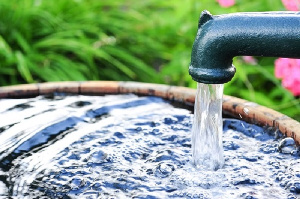 Women walking down dirty roads with jugs of water on their heads is not yet a thing of the past
Women walking down dirty roads with jugs of water on their heads is not yet a thing of the past
A report by Global Water Partnership, an international Organisation with a focus on water resources management, found Ghana in the medium to low range in the implementation of gender mainstreaming policies.
The report said although Ghana and other medium-low ranked countries had good policies detailing the roles of women in water resources management, they were still struggling to implement them.
“Photographs of women walking down dirty roads with jugs of water on their heads – cast in roles as water carriers instead of water managers – is not yet a thing of the past,” it said
The report said women’s role in managing water resources had been recognised by the United Nations since 1992 as being of central importance but progress had been slow with men still dominating the management of water resources.
“Half of all countries reported limited or no achievement of gender objectives in their water management policies and plans,” said Darío Soto-Abril, Executive Secretary of Global Water Partnership.
“While some reasons for this low number might be a lack of robust data collection and monitoring tools, the number is still low enough for us to say that things must change.”
The report, on the theme, “Advancing towards gender mainstreaming in water resources management,” found that gender and inclusion policies had been developed in many countries but there was still a gap between policy and practice and that policies were not always accompanied by concrete action plans, nor were they adequately funded.
“One of the most important changes countries can make is to enable women to participate at all levels in decision-making about the use of water resources. This has to be a commitment at the highest political level and backed up with actions,” said Soto-Abril.
Joakim Harlin, Chief, Freshwater Ecosystems Unit of United Nations Environment Programme, noted, “If there is good news, it’s that, there’s been a slight improvement compared to the baseline in 2017. We should also make it clear that countries doing well in gender mainstreaming can be found all over the world and in all income categories. The ability to integrate gender considerations in water policies is not related exclusively to levels of development – it’s also a question of having the political will to change cultural norms.”
The report recommended that countries ranked medium-low established gender units in all ministries with technical engineers and gender experts.
It said the units should conduct gender evaluations and gender impact assessments to identify the lack of progress using gender-disaggregated data.
The report said the evaluations would provide systemic and objective assessments of the implementation and results of ongoing and completed water projects from gender perspectives.
It said the evaluations should consider all factors that could affect the ability of women and other vulnerable groups to fully participate in water strategies, including proprietary rights, inheritance laws, land tenure, and cultural norms.
Mr. Attah Arhin, Executive Chairman, Coalition of NGOs in Water and Sanitation, said the report did not come as a surprise because Ghana had almost all the necessary policies and strategies, including those for the efficient management of water resources but implementation had always been the challenge.
He said the country could boast of an environmental sanitation policy, rural sanitation model and strategy, integrated water resources management strategy, rainwater harvesting strategy, adding that,
“… If we were implementing all these policies and strategies, this country will see the great transformation.”
“Sadly, we put these fine documents on the shelves and when they expire, we mobilise resources to review them again.”
Mr. Arhin said the Environmental Sanitation Policy, for example, was one of the most technically sound policy documents but it was due for review when the country had not adequately implemented it.
He said the country needed to establish policy/strategy implementation teams that would push for the effective implementation of the policies and strategies and track progress.
Mr. Arhin noted that funding had also always been used as an excuse for lack of implementation and suggested that before policies and strategies were launched, a clear financing arrangement be put in place to ensure effective implementation.
“Policy and strategy dissemination is also crucial. It is important that when policies and strategies are launched, all relevant stakeholders are engaged so that these stakeholders can mobilise resources to drive implementation,” he added.
Females make up 50.7 percent of Ghana’s population, males, 49.3 percent, according to provisional census results from the Ghana Statistical Service.
Improved water sources are said to be available to 80 percent of Ghanaians but the management of the resources remained a huge challenge with issues of illegal mining, waste/chemical pollution, wrong agricultural activities, climate change, and water weeds.